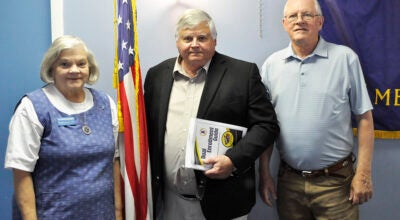County faces ‘silent crises’
Published 9:48 pm Tuesday, March 29, 2011
Pike County Engineer Russell Oliver wants to make taxpayers aware of the “silent crisis” plaguing the county and the state.
“The crisis is, we’re under-funded, and we don’t get any diesel fuel tax revenue. We’ve got big trucks driving on our roads and we don’t get any of the revenue from the diesel fuel tax that they pay. Instead, all we get is gasoline tax revenues and we don’t get much of that,” Oliver said.
According to Oliver, the percentage of gasoline tax revenues paid to counties have been the same since 1993, which means that Pike County has not received a “raise” to work on roads since 1993, even though the costs of highway, road and bridge construction have outpaced inflation.
“The costs of doing work on roads and bridges has steadily increased, faster and at a higher rate, than inflation,” Oliver said. “Basically, it costs us much, much, more to work on roads and bridges than it did 10 or 15 years ago. Yet, our revenues have been flat.”
Oliver said that the “big trucks” were, indeed, important for commerce, but they present a particular problem.
“We are in favor trucking,” Oliver said. “We need trucks, but the fact is those trucks get much heavier loads than a passenger car or a small pickup truck and do more damage to our county roads, which in most cases were not designed and built to carry those heavy loads. Even though they are doing damage to our county roads, we don’t get any revenue from the taxes they pay.”
And the damage to roads and bridges is costing Alabama taxpayers.
“Decaying roads and bridges cost the average Alabamian an additional $162 a year,” Oliver said. “That’s because you get reduced gas mileage (and) significant wear on tires.”
Amendment 1, the most recent state program for funding road and bridge repairs, lasted only five years and hasn’t kept up with ongoing needs.
“Whatever the answer is, people need to understand the problem first,” Oliver said.
“I’m not suggesting an answer, we’re just wanting to get the word out.”
Although Oliver said he is simply trying to get the word out, he cites a bill in front of the Legislature that may provide a solution.
The Local Transportation Safety Initiative is a proposal that would allow the county commission to call for a local referendum to levy a local gas or fuel tax of up to 5 cents per gallon for specific county road and bridge projects identified by the county commission prior to the referendum.
“This would give the counties the authority to put a temporary fuel tax on the ballot for the people to approve,” Oliver said.
“It would identify specific projects where the money would be spent and that money would not be able to be spent anywhere else except on those specific projects. Then, once the money was spent and the projects were completed the tax would go away.”
Oliver said the bill puts the decision-making power in the people’s hands.






